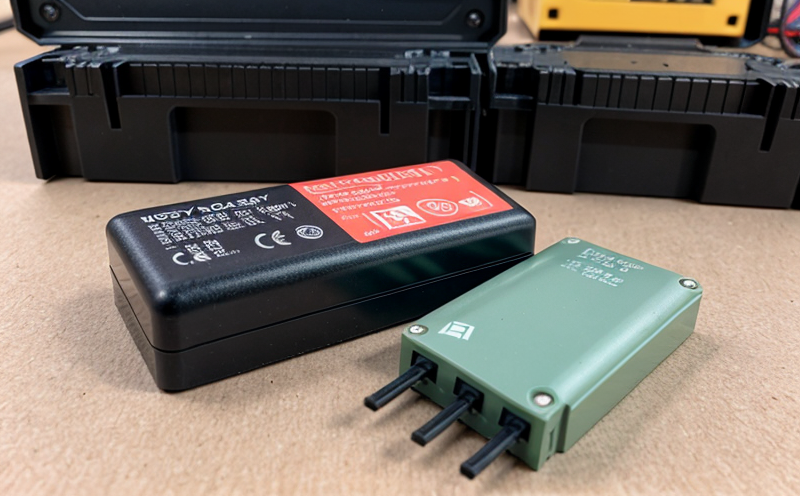IEC 62877-2 Electrolyte Related Performance Testing of Lead-Acid Battery Packs
The International Electrotechnical Commission (IEC) Standard IEC 62877-2 provides a detailed framework for the performance testing of lead-acid battery packs with respect to their electrolyte-related parameters. This standard is crucial in ensuring that battery systems meet stringent safety and performance requirements, especially those used in critical applications such as uninterruptible power supplies (UPS), electric vehicles, and renewable energy storage.
IEC 62877-2 focuses on the evaluation of the electrolyte's role in the overall performance characteristics of lead-acid battery packs. The standard covers a range of tests that assess the stability, durability, and operational reliability of these batteries under various environmental conditions. This includes testing for temperature cycling, charge/discharge cycles, and the effects of moisture or humidity on the battery's integrity.
The electrolyte is one of the key components that influence the longevity and performance of lead-acid batteries. It facilitates the chemical reactions during charging and discharging processes, affecting the battery’s efficiency, self-discharge rate, and cycle life. Therefore, IEC 62877-2 provides a comprehensive approach to evaluating these factors by subjecting the battery packs to specific test protocols.
A detailed overview of the tests includes:
- Electrolyte concentration measurement
- Oxidation-reduction potential (ORP) determination
- Specific gravity and density checks
- Viscosity assessment
- pH value verification
- Electrical conductivity analysis
- Resistivity evaluation
The tests are conducted in controlled environmental conditions to simulate real-world scenarios. This ensures that the battery packs perform optimally under various operational and storage conditions.
For quality assurance, IEC 62877-2 mandates rigorous testing procedures involving:
- Calibration of all measuring instruments
- Standardized specimen preparation
- Consistent environmental controls during testing
- Data logging and analysis protocols
The results from these tests are crucial for compliance with international standards, ensuring that the battery packs meet the specified performance criteria. Compliance with IEC 62877-2 not only enhances product reliability but also aids in regulatory approval processes.
Our laboratory adheres strictly to this standard, employing state-of-the-art equipment and experienced personnel to ensure accurate and reliable test results. This commitment to quality is further reinforced by our accreditation from reputable bodies, ensuring that the testing meets the highest industry standards.
Benefits
Adhering to IEC 62877-2 Electrolyte Related Performance Testing of Lead-Acid Battery Packs offers numerous benefits:
- Enhanced Reliability: By ensuring that the electrolyte-related parameters are within acceptable limits, the reliability and longevity of lead-acid battery packs are significantly improved.
- Compliance with Standards: Meeting international standards enhances your product's marketability and opens doors to global markets.
- Improved Safety: Rigorous testing ensures that batteries meet stringent safety requirements, reducing the risk of accidents or malfunctions.
- Cost Efficiency: Early identification of potential issues through comprehensive testing can prevent costly failures in the long run.
- Enhanced Reputation: Demonstrating compliance with IEC standards reinforces your company's commitment to quality and safety, enhancing customer trust and satisfaction.
- Regulatory Approval: Meeting these standards is often a prerequisite for regulatory approval, streamlining the certification process.
In summary, IEC 62877-2 Electrolyte Related Performance Testing of Lead-Acid Battery Packs is essential for ensuring that your battery packs meet the highest safety and performance standards. This not only enhances product quality but also ensures compliance with international regulations, thereby safeguarding both users and manufacturers.
Eurolab Advantages
At Eurolab, our commitment to excellence in testing and certification is unparalleled. Our expertise in IEC 62877-2 Electrolyte Related Performance Testing of Lead-Acid Battery Packs sets us apart:
- Accreditation: We are accredited by reputable bodies ensuring that our tests meet the highest standards.
- State-of-the-Art Equipment: Our laboratory is equipped with the latest testing instruments to ensure accurate and reliable results.
- Experienced Personnel: Our team of experts has extensive experience in lead-acid battery testing, ensuring precise and consistent test outcomes.
- Comprehensive Reporting: We provide detailed reports that include all test parameters, enabling you to make informed decisions about your product's performance.
- Rapid Turnaround Times: Our efficient processes allow for quick turnaround times without compromising on quality.
- Dedicated Support: Our customer support team is always available to assist you with any queries or concerns, ensuring a seamless testing experience.
Choosing Eurolab means choosing a partner committed to excellence and reliability in battery testing. We are dedicated to helping you meet your quality assurance goals through our comprehensive services and unwavering commitment to accuracy and precision.
Customer Impact and Satisfaction
The impact of IEC 62877-2 Electrolyte Related Performance Testing on customers is profound. By ensuring that lead-acid battery packs meet the highest standards, we contribute significantly to:
- User Safety: Compliance with these standards minimizes the risk of accidents and malfunctions, enhancing user safety.
- Product Lifespan: Testing ensures that batteries perform optimally under various conditions, extending their useful life.
- Market Access: Meeting international standards opens up opportunities for global market entry, increasing sales potential.
- Customer Trust: Demonstrating compliance with IEC 62877-2 fosters trust and confidence in your brand among consumers.
- Sustainability: Reliable batteries contribute to efficient energy use, supporting sustainability goals.
We are committed to delivering services that not only meet but exceed customer expectations. Our comprehensive testing ensures that you can offer products that are safe, reliable, and sustainable, enhancing overall customer satisfaction.





